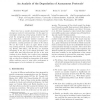Free Online Productivity Tools
i2Speak
i2Symbol
i2OCR
iTex2Img
iWeb2Print
iWeb2Shot
i2Type
iPdf2Split
iPdf2Merge
i2Bopomofo
i2Arabic
i2Style
i2Image
i2PDF
iLatex2Rtf
Sci2ools
100
click to vote
NDSS
2002
IEEE
2002
IEEE
An Analysis of the Degradation of Anonymous Protocols
There have been a number of protocols proposed for anonymous network communication. In this paper we investigate attacks by corrupt group members that degrade the anonymity of each protocol over time. We prove that when a particular initiator continues communication with a particular responder across path reformations, existing protocols are subject to the attack. We use this result to place an upper bound on how long existing protocols, including Crowds, Onion Routing, Hordes, Web Mixes, and DC-Net, can maintain anonymity in the face of the attacks described. Our results show that fully-connected DC-Net is the most resilient to these attacks, but it suffers from scalability issues that keep anonymity group sizes small. Additionally, we show how violating an assumption of the attack allows malicious users to setup other participants to falsely appear to be the initiator of a connection.
Anonymity | Anonymous Network Communication | Computer Networks | Initiator Continues Communication | NDSS 2002 |
Related Content
| Added | 15 Jul 2010 |
| Updated | 15 Jul 2010 |
| Type | Conference |
| Year | 2002 |
| Where | NDSS |
| Authors | Matthew Wright, Micah Adler, Brian Neil Levine, Clay Shields |
Comments (0)

